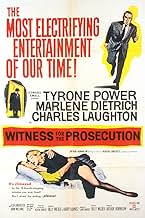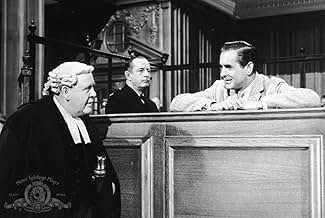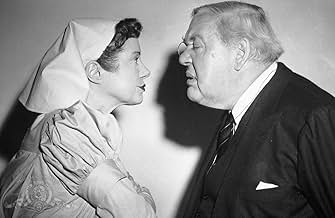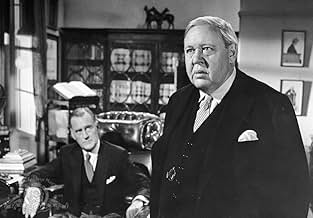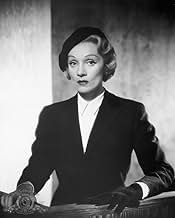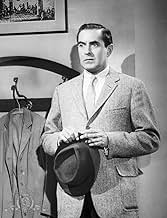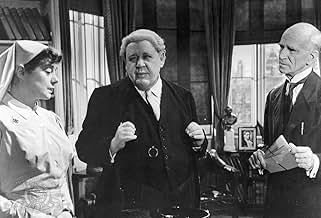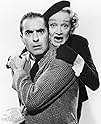Un avvocato britannico navigato deve difendere il suo cliente in un processo per omicidio che rivela una sorpresa dopo l'altra.Un avvocato britannico navigato deve difendere il suo cliente in un processo per omicidio che rivela una sorpresa dopo l'altra.Un avvocato britannico navigato deve difendere il suo cliente in un processo per omicidio che rivela una sorpresa dopo l'altra.
- Regia
- Sceneggiatura
- Star
- Candidato a 6 Oscar
- 3 vittorie e 15 candidature totali
Patrick Aherne
- Court Officer
- (non citato nei titoli originali)
Don Ames
- Bar Patron
- (non citato nei titoli originali)
Larry Arnold
- Courtroom Spectator
- (non citato nei titoli originali)
Walter Bacon
- Bar Patron
- (non citato nei titoli originali)
Eddie Baker
- Courtroom Spectator
- (non citato nei titoli originali)
Trama
Lo sapevi?
- QuizCharles Laughton, who could be moody and difficult, was apparently a dream to work with, throwing himself into the role with dedication and delight. Billy Wilder later recalled a day that was set aside just for shooting reaction shots of the jury and courtroom crowd (composed of extras hired only for the day). Normally, the assistant director would read the actors' lines, and the extras would react. However, Laughton, who was fascinated with the whole process of filmmaking, begged to help. So he came in on his day off and read all of the off-camera speeches to the jury members. He not only read his part but also the judge's, the prosecutor's, and even Marlene Dietrich's. According to biographer Maurice Zolotow in his book "Billy Wilder in Hollywood", "it was an exhibition of craftsmanship such as Wilder had never seen. He believes that Charles Laughton had the greatest technical range and power of any actor, man or woman, whom he has known."
- Blooper(at around 9 mins) Inside his chamber, Sir Wilfrid lights his cigar, and Leonard Vole locks the door to make sure that Miss Plimsoll can't enter the room and catch him smoking. Later (at around 15 mins), Wilfrid leaves his chamber without first unlocking the door.
Actually, Vole does not lock the door, but puts the keyhole cover in place to stop Plimsoll spying through the keyhole.
- Citazioni
Sir Wilfrid: I am constantly surprised that women's hats do not provoke more murders.
- Curiosità sui creditiAs the end credits appear on screen, an announcer's voice is heard: "The management of this theater suggests that for the greater entertainment of your friends who have not yet seen the picture you will not divulge to anyone the secret of the ending of Witness for the Prosecution."
- ConnessioniFeatured in Marlene (1984)
- Colonne sonoreI May Never Go Home Anymore
Music by Ralph Arthur Roberts
Lyrics by Jack Brooks
Sung by Marlene Dietrich (uncredited)
Reprised a cappella by Tyrone Power (uncredited)
Recensione in evidenza
Witness for the Prosecution is one of the most entertaining courtroom stories of all time, written by the crime mistress herself, Agatha Christie. Charles Laughton completely owns the courtroom, starring as a famously brilliant barrister who's supposed to be taking a break for his health-but he gets drawn in by a truly compelling murder trial. Tyrone Power, in his last movie, has been accused of murdering a wealthy older woman. While all the evidence racks up against him, Charles doesn't give up hope and tries to win the case, all the while trying to crack the very hard nut Marlene Dietrich. Marlene is Tyrone's wife, and it's impossible to tell what she's really thinking or feeling.
I love this story, and I love both versions of the film, from 1957 and 1982. It's incredibly suspenseful and interesting-and also quite impossible to talk about without giving spoilers. If you've never seen Witness for the Prosecution, add this one to your list of classics to rent. The acting is fantastic, and the timing makes it a very entertaining old movie to watch. There are no boring bits in this drama; and I guarantee you'll still sit on the edge of your seat the second time you watch it.
I love this story, and I love both versions of the film, from 1957 and 1982. It's incredibly suspenseful and interesting-and also quite impossible to talk about without giving spoilers. If you've never seen Witness for the Prosecution, add this one to your list of classics to rent. The acting is fantastic, and the timing makes it a very entertaining old movie to watch. There are no boring bits in this drama; and I guarantee you'll still sit on the edge of your seat the second time you watch it.
- HotToastyRag
- 15 apr 2018
- Permalink
I più visti
Accedi per valutare e creare un elenco di titoli salvati per ottenere consigli personalizzati
Dettagli
- Data di uscita
- Paese di origine
- Lingue
- Celebre anche come
- Testigo de cargo
- Luoghi delle riprese
- Azienda produttrice
- Vedi altri crediti dell’azienda su IMDbPro
Botteghino
- Budget
- 3.000.000 USD (previsto)
- Lordo in tutto il mondo
- 7903 USD
- Tempo di esecuzione1 ora 56 minuti
- Colore
- Proporzioni
- 1.66 : 1
Contribuisci a questa pagina
Suggerisci una modifica o aggiungi i contenuti mancanti


![Guarda Trailer [OV]](https://m.media-amazon.com/images/M/MV5BNTM2MjYzMjAtZjI5MC00YTI1LWI2MzAtMWFlNDc2OTU1MTRiXkEyXkFqcGdeQXRyYW5zY29kZS13b3JrZmxvdw@@._V1_QL75_UX500_CR0,0,500,281_.jpg)
